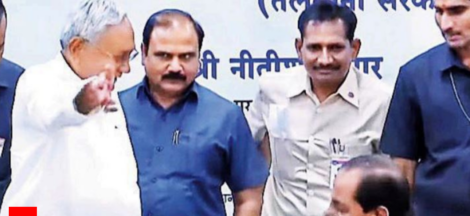By Amulya Ganguli
The writing is on the wall. It is now obvious that a united opposition can defeat the BJP. As much is clear from the Kairana and Noorpur by-election results which are a continuation of the anti-BJP trends noted earlier in Gorakhpur and Phulpur.
These outcomes are of particular interest because they pertain to U.P. where the BJP won 71 of the 80 parliamentary seats in 2014. The party’s dependence, therefore, on the need to put up a good show in the state is obvious if it wants to win the next general election. However, Kairana and Noorpur have been a dampener for the party. The results in these constituencies must also be disheartening for the U.P. chief minister, Yogi Adityanath, who is regarded as the BJP’s poster boy.
It will not do for the BJP to describe the alliance between the RLD, the SP, the BSP and the Congress in Kairana as opportunist because it had constituted similar tie-ups in Goa, Manipur and Meghalaya. Surely, what is opportunism for the BJP’s opponents cannot be deemed “principled” for the saffron party.
What the verdicts in U.P. have also highlighted is the failure of the BJP’s communal agenda which again came to the fore during the sudden raising by the saffron cadres of the issue of a portrait of Mohammed Ali Jinnah which has been on display in Aligarh Muslim University since 1938. If the BJP’s polarization tactic failed, so did the idea of Narendra Modi’s charisma which could not influence the Kairana and Noorpur results despite the prime minister’s rallies and roadshows in nearby areas.
Clearly, the promise of vikas is not working either because development is not taking place at least where the question of employment is concerned or that the claims about growth are seen as a jumla or a deceitful tactic since the saffron brotherhood’s real focus is not on the economy but on creating Hindu-Muslim rifts as could be seen from BJP M.P. Vinay Katiyar’s observation that the Muslims have no right to live in India and should go to Pakistan or Bangladesh.
If the Karnataka outcome showed that Modi’s 21 rallies were not enough to swing an election in the BJP’s favour, the U.P. verdict was a further confirmation of the possibility that the Modi magic is fading.
It is not only the BJP which appears to be in trouble, even its ally in Bihar, the Janata Dal (United), must be realizing the mistake it made when it switched its allegiance from the “secular” maha gathbandhan (grand alliance) to the BJP.
If Bihar chief minister Nitish Kumar wanted to get away from the dominance of the RJD leader, Laloo Prasad Yadav, it was a miscalculation in the sense that he came under the BJP’s domination instead which has apparently not gone down well with not only the minorities but also the people of the state in general who do not like to see their chief minister being at the BJP’s beck and call. Hence, the RJD’s success in Jokihat, which is the third successive victory of the RJD in recent months after its successes in Araria and Jehanabad.
There is little doubt that the Jokihat result will induce rethinking in the Nitish Kumar camp not only about the ties with the BJP but also about his favourite prohibition policy as it evidently hasn’t enhanced his popularity.
The BJP, on its part, will draw some comfort from its success in Palghar over the Shiv Sena. But what it may be worried about is the possibility of the Shiv Sena joining the “secular” parties in an anti-BJP formation at least in Maharashtra if not in the rest of the country. The reason why there may be such an unlikely combination is that it will not be easy for the Shiv Sena to overturn its strident anti-BJP rhetoric of the past several years and make up with its senior partner in Maharashtra. With the NCP faring well in Bhandara-Gondia, it may not be entirely fanciful to see a formal or informal Congress-NCP-Shiv Sena alliance in the state.
If anti-incumbency saw the defeats suffered by Yogi Adityanath’s government in U.P., it had no impact on the governments in West Bengal and Kerala where the Trinamool Congress and the CPI(M) have won in Maheshtala and Chengannur, respectively. The former’s success shows that the countrywide outrage over the violence during the recent panchayat elections in West Bengal has had no effect on Mamata Banerjee’s image. Similarly, the unfortunate CPI(M)-RSS clashes and murders in Kerala has left the Pinarayi Vijayan government unaffected.
The lesson which the opposition at the national level will have to learn is that the anti-BJP forces must swim together if they do not want to sink. It remains to be seen whether the Janata Dal (Secular)-Congress government in Karnataka will realize that it cannot give any impression of being an unstable combine even if the two parties do not appear to be natural allies.(IPA Service)
The post By-Poll Results Give Big Boost To Opposition Unity appeared first on Newspack by India Press Agency.


